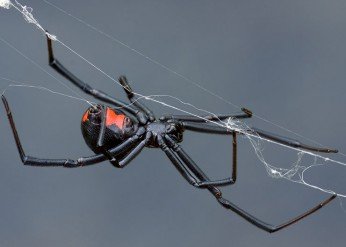Research
Researchers further unravel mystery of how black widow spiders create steel-strength silk webs
October 22, 2018
 Evanston, Ill.–Researchers at Northwestern University and San Diego State University (SDSU) have better unraveled the complex process of how black widow spiders transform proteins into steel-strength fibers. This knowledge promises to aid scientists in creating equally strong synthetic materials.
Evanston, Ill.–Researchers at Northwestern University and San Diego State University (SDSU) have better unraveled the complex process of how black widow spiders transform proteins into steel-strength fibers. This knowledge promises to aid scientists in creating equally strong synthetic materials.
Black widow spiders and their relatives, native to temperate climates in North America, Europe, Asia, Australia, Africa and South America, produce an array of silks with exceptional materials properties.
Scientists have long known the primary sequence of amino acids that make up some spider silk proteins and understood the structure of the fibers and webs. Previous research theorized that spider silk proteins await the spinning process as nano-size amphiphilic spherical micelles (clusters of water soluble and non-soluble molecules) before being funneled through the spider’s spinning apparatus to form silk fibers. However, when scientists attempted to replicate this process, they were unable to create synthetic materials with the strengths and properties of native spider silk fibers.
“The knowledge gap was literally in the middle,” Northwestern’s Nathan C. Gianneschi said. “What we didn’t understand completely is what goes on at the nanoscale in the silk glands or the spinning duct — the storage, transformation and transportation process involved in proteins becoming fibers.” Read the full article at Northwestern Now.
The International Institute for Nanotechnology at Northwestern University is an umbrella organization that represents and unites more than $1 billion in nanotechnology research, education and supporting infrastructure.